Curious about recent developments in educational technology? The OISE Library has recently acquired some new titles that shed light on how technology is being used in education, while considering how instruction and learning are affected by technology.
Digital Badges in Education: Trends, Issues, and Cases (2016) offers an extensive overview about digital badging systems, which are increasingly used as tools to represent a learner’s credentials in an online environment. Edited by Lin Y. Muilenburg and Zane L. Berge, this 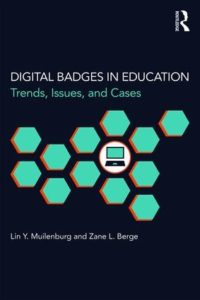 publication includes 25 chapters that explore the use of digital badges in both professional and academic settings, and provide the reader with insight into their implementation. The book begins with chapters that cover the history, trends, and issues of digital badges. Other chapters address a number of cases including digital badges for K-12 learners, higher education, and adult learning. Readers should find this book to be useful for developing digital badges learning projects in a variety of learning contexts.
publication includes 25 chapters that explore the use of digital badges in both professional and academic settings, and provide the reader with insight into their implementation. The book begins with chapters that cover the history, trends, and issues of digital badges. Other chapters address a number of cases including digital badges for K-12 learners, higher education, and adult learning. Readers should find this book to be useful for developing digital badges learning projects in a variety of learning contexts.
Using Games and Simulations for Teaching and Assessment: Key Issues surveys how games and computer-based simulations are used as educational tools. Published in 2016, this collection contains 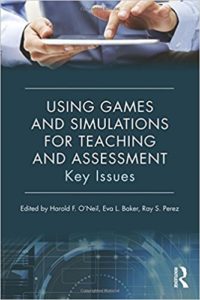 chapters that identify issues surrounding the design and development of games and simulations. The authors consider learning games in a variety of education and training contexts, including K-12 and higher education. Chapters in the collection’s first part investigate theories, frameworks, and contexts of learning games. The following three parts describe assessment, cognitive, motivational, and psychometric issues. This collection examines both theoretical and design aspects of computer-based simulations and games, and emphasizes how games can address the science of learning.
chapters that identify issues surrounding the design and development of games and simulations. The authors consider learning games in a variety of education and training contexts, including K-12 and higher education. Chapters in the collection’s first part investigate theories, frameworks, and contexts of learning games. The following three parts describe assessment, cognitive, motivational, and psychometric issues. This collection examines both theoretical and design aspects of computer-based simulations and games, and emphasizes how games can address the science of learning.
Educational Psychology and the Internet discusses the role of the internet in education. In this 2016 publication, Michael Glassman draws from past and current research to consider several issues about “Internet-infused education”. Key terms and concepts about 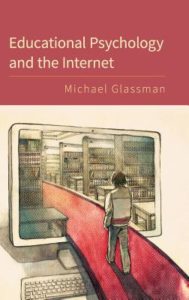 the internet such as cyberspace and hypertext are defined and put into the context of education. The textbook identifies issues such as net neutrality and open source licenses that are increasingly relevant to educators and students who use the internet as part of the learning process. The author also addresses the internet’s use for learning through course management systems, social networking sites, and blogs. Glassman’s research can be applied to several educational projects and initiatives such as massive open online courses (MOOCs), and open educational resources.
the internet such as cyberspace and hypertext are defined and put into the context of education. The textbook identifies issues such as net neutrality and open source licenses that are increasingly relevant to educators and students who use the internet as part of the learning process. The author also addresses the internet’s use for learning through course management systems, social networking sites, and blogs. Glassman’s research can be applied to several educational projects and initiatives such as massive open online courses (MOOCs), and open educational resources.
Part of the Routledge Research in Education series, 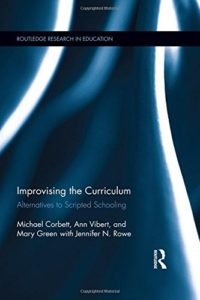 Improvising the Curriculum: Alternatives to Scripted Schooling explores how curricula can be improved. The authors argue that improvisational techniques can be applied to developing and delivering curricula. Improvising curricula can offer useful approaches for teachers. This volume describes a research project about the use of student filmmaking by teachers at a school to learn how improvisational techniques can be applied to curricula. Published in 2016, this volume is also available as an electronic resource.
Improvising the Curriculum: Alternatives to Scripted Schooling explores how curricula can be improved. The authors argue that improvisational techniques can be applied to developing and delivering curricula. Improvising curricula can offer useful approaches for teachers. This volume describes a research project about the use of student filmmaking by teachers at a school to learn how improvisational techniques can be applied to curricula. Published in 2016, this volume is also available as an electronic resource.
Technology for Transformation Perspectives of Hope in the Digital Age presents an edited collection of essays that examine the relationship between 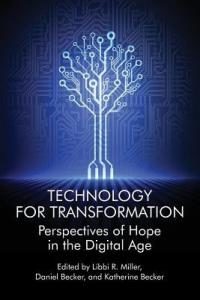 educational technology and social justice. The editors argue that educational technology is not value-free, and that technology can contribute to the transformative goals of social justice. The essays explore different perspectives on research, theory, and case studies that show how educational technology is used by students and teachers in various educational contexts. The first two sections of the book cover a diverse range of topics including how technology is used in educational contexts, and how it can support social justice. The third section explores how social education can be integrated into teacher education. The final section of the book considers how educational technology and social justice are applied by K-12 educators and students. This book will appeal to practitioners, scholars, and policymakers with an interest in the emerging importance of educational technology.
educational technology and social justice. The editors argue that educational technology is not value-free, and that technology can contribute to the transformative goals of social justice. The essays explore different perspectives on research, theory, and case studies that show how educational technology is used by students and teachers in various educational contexts. The first two sections of the book cover a diverse range of topics including how technology is used in educational contexts, and how it can support social justice. The third section explores how social education can be integrated into teacher education. The final section of the book considers how educational technology and social justice are applied by K-12 educators and students. This book will appeal to practitioners, scholars, and policymakers with an interest in the emerging importance of educational technology.
These books are on display on the “New Arrivals” shelf on the ground floor of the OISE library, across from the reference desk.
